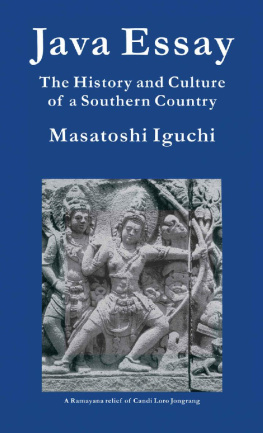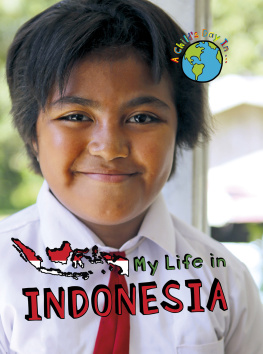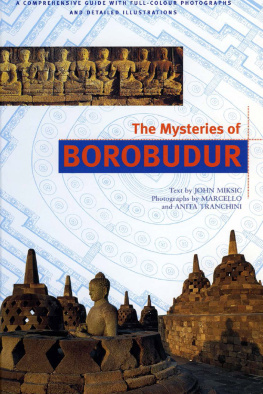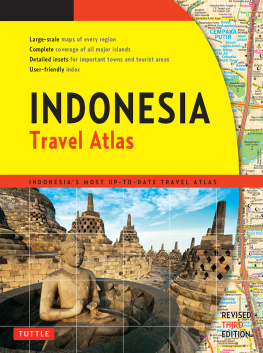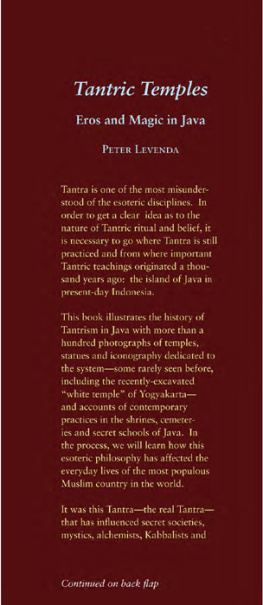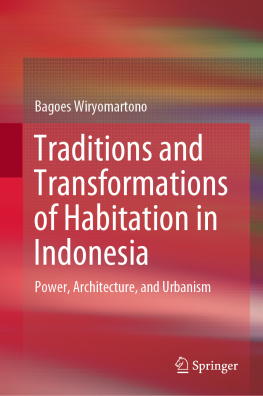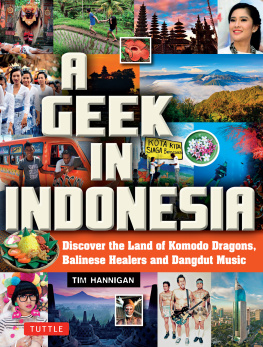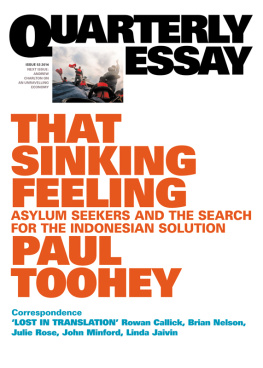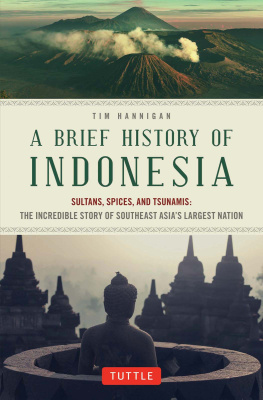Java Essay
The history and culture of a southern country
Masatoshi Iguchi

Copyright Masatoshi Iguchi 2015
The moral right of the author has been asserted.
Apart from any fair dealing for the purposes of research or private study, or criticism or review, as permitted under the Copyright, Designs and Patents Act 1988, this publication may only be reproduced, stored or transmitted, in any form or by any means, with the prior permission in writing of the publishers, or in the case of reprographic reproduction in accordance with the terms of licences issued by the Copyright Licensing Agency. Enquiries concerning reproduction outside those terms should be sent to the publishers.
Matador
9 Priory Business Park,
Wistow Road, Kibworth Beauchamp,
Leicestershire LE8 0RX
Tel: (+44) 116 279 2299
Fax: (+44) 116 279 2277
Email:
Web: www.troubador.co.uk/matador
ISBN 9781784628857
First print November 2014
Published January 2015
British Library Cataloguing in Publication Data.
A catalogue record for this book is available from the British Library.

Matador is an imprint of Troubador Publishing Ltd
Foreword by Prof. Malcolm R. Mackley
The Java Essay written by Toshi Iguchi is a synthesis of his own initial interest and then total fascination with Indonesia. His scientific training and curiosity set him on a path to discover something about this country whose history has not been particularly well studied in the past. He became intrigued by the ancient architecture, which in turn resulted in proving the origins of earlier Indonesian cultures.
On reading the essays I was surprised to learn that so little was known about the history of such an important country. Using his scientific background and command of many different languages, Toshi delves into Indonesias past and bravely tries to understand some of the links between different people, places and remaining monuments. There are uncertainties in some of his conjectures; however, his writing forms a basis for discussion and perhaps a starting point for future generations to prove him right or wrong.
Toshi was trained as a scientist and became a historian of Indonesia. His interest in the country is profound and he has studied its history as an academic, as an enthusiast, as a scientist and above all as someone with a passion that developed from spending time living in the country.
The first chapter of the Java Essay is a resume of the history of Java and this provides useful information on the way different dynasties have ruled different parts of the island for the last two thousand years. The next two chapters concern themselves with the birth of Jagatara and the subsequent emergence of Jakarta as we know it today. This is not told in a simple, factual way, but by means of a number of stories or essays relating to facts and legends surrounding the city and its life. A quite different chapter then follows the uncovering of ancient monuments throughout Java and here it is obvious that Toshi Iguchi has a particular mission in trying to understand just by who and why many of these monuments were built. Subsequent chapters examine the spiritual life, myths, poetry and even theatre of Indonesia in an attempt to paint a picture of the country in the past.
The stories are both illuminating and informative. The book contains many illustrations and this gives vitality to these essays. As a scientist Toshi is familiar with telling scientific stories with the aid of figures and diagrams. As a historian of Indonesia he uses a multitude of past drawings, pictures and scripts to help the reader appreciate the story he is telling.
Our first meeting was in 1996 when he masterminded a Green Polymer Workshop centred at Bandung and this was also my first exposure to Indonesia. Subsequently a friendship that initially centred around our common scientific interest in polymers developed and then broadened to an appreciation of his profound interest in the importance of history and in particular his fascination with all things Indonesian. The Java Essay is a central part of Toshis life and I very much hope readers will enjoy learning about the history of Indonesia from his unique approach, style and passion for this subject.
Malcolm R. Mackley
Cambridge, United Kingdom
May 2014
Preface
Java is an island that is a little smaller than Great Britain or two-thirds of Japans Honsh, located a little south towards the equator in Southeast Asia. It was thirty years ago when I, the present writer, who had put himself in a corner of natural science and worked for a governmental research institution, visited there for the first time. Although it was an official trip of only one week, the world looked to have two-dimensionally developed, as really was, for a person who before then had only been to Europe and North America of the same mid-latitude. It was not only because I saw the rich, tropical nature, but also because I met warm-hearted people of the southern country and touched their indigenous culture. After that, I was seconded to Bandung to stay there for two years, probably by the will of god. When retiring age arrived, I received a fellowship and worked for three years in a research laboratory in Bogor. After returning home, although I was given some opportunities to stay in domestic and overseas universities, I was absorbed, during the last ten years, in the study of the dramatic history and the beautiful culture of Java by which I was moved during my stay there, leaving polymer science of my own accord. Time favoured an outsider to access knowledge of different disciplines with the advance of the Internet. Besides giving secondary knowledge on its own articles, the Internet enabled me to find all sorts of new and antique books stocked in bookstores from all over the world and order them online. By means of email, I was able to contact at any time friends in Indonesia and Europe to ask for their help with linguistic problems. Having retired, I had freedom to visit historical sites and to learn directly from experts in Indonesia. I am especially indebted to Raden Ayu Mrs E. Sundari, M.A., Senior Curator of the National Museum of Indonesia, who kindly gave her precious knowledge about the history and culture of Java, which was not available from books and documents.
My first task was to bring the English translation of Marquis Tokugawas famous travelogue, Jagatara Kikou (originally published from Kydo-shuppansha, Nagoya, Japan in 1931), into publication, as:
Marquis Tokugawa (translated by M. Iguchi, Journeys to Java, ITB Press, Bandung 2004, IBSN 979-3507-25-x
The original English text was drafted earlier, when I had participated in the preparation of an international scientific meeting held in Bandung in 1996, and printed as a private book of the Tokugawa Reimeikai Foundation, entitled Travels around Java in the 1920s, to be distributed as reference material for introducing Java to the participants from abroad. For publishing it as a proper book, the text was thoroughly revised, more footnotes were added and an album of contemporary images collected from other sources were appended, receiving full support from the Owaari-Tokugawa family. The books Indonesian version was published two years later, translated by my young friends, as:
Marquis Tokugawa (diterjemahkan oleh Ririn Anggraeni dan Apriyanty Isanasai), Perjalanan menoejoe Djawa, Penerbit ITB, Bandung 2006, IBSN 979-3507-87-x
A number of colleagues of mine who read Tokugawas book told me of their admiration for the broad knowledge and deep insight of the original author who was a nobleman, historian and scientist, and appreciated the apparatuses (the introduction, notes, etc.) provided by the translator, and gave me an order to write my own essay in the future. In fact, I had felt not quite satisfied with the books on Java available at that time.

